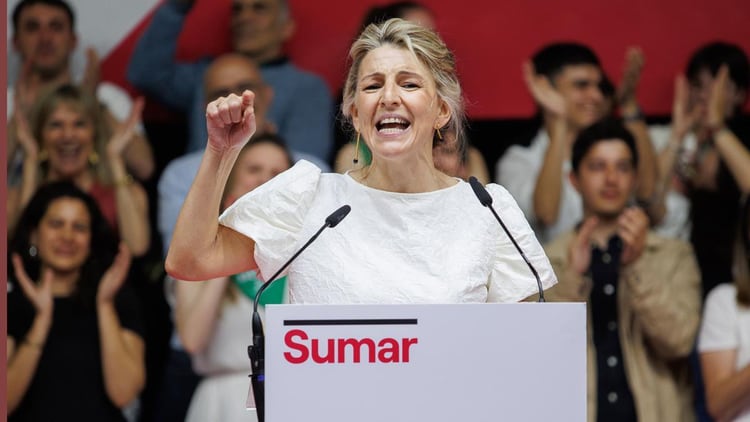Ángel Collado
Pedro Sánchez’s first fiasco in the launch of his second vice-president Yolanda Díaz as the candidate of the entire far left in his coalition government: Podemos, the main party in this political space, has still not joined the operation.
The party founded by Pablo Iglesias and now led by ministers Ione Belarra and Irene Montero withdrew from Díaz’s pre-electoral presentation despite governmental pressure, from all its public media outlets plus the like-minded private ones, for its leaders to bow to Sánchez’s plan to protect the unity of the left as a bloc.
It is now a year since the chief executive publicly outlined his project to remain in power for the next legislature, defining the extreme populist left with which he already governs as “the space represented by Yolanda Díaz”. Thus began the suspicions in Podemos, which have now turned into an open clash with the vice-president, who has been promoted to the post at the behest of Pablo Iglesias but does not usually submit to Podemos discipline in internal cabinet wars.
A militant of the Communist Party, in turn integrated into Izquierda Unida and coming from the trade union world (Comisiones Obreras), Díaz is a key player in Sánchez’s convoluted project to maintain his current parliamentary majority. In addition to wearing himself out little or nothing at the head of the PSOE, now with 120 MPs in a parliament with 350 seats, he needs his partners in Podemos and assimilated parties (now 35) not to lose their footing either.
The pro-independence allies have allowed the president of the government a personally comfortable legislature with absolute majorities in the main votes at the cost of favours or concessions on matters of state. But his arithmetical room for manoeuvre barely amounts to a dozen votes in Congress. If the far left, which attracted 13 per cent of the electorate in 2019, collapses in the next elections, as all the private polls indicate, Sánchez would not be able to repeat.
In the pro-Sanchez sector of the Executive, they are looking to Díaz for the solution to Podemos’ poor image and contrast the self-proclaimed success of the labour reform with the failure of Irene Montero’s “only yes is yes law”. They also focus on promoting the virtues of the vice-president’s friendly manner against the aggressiveness of her ministerial opponents in her own sector: the head of Equality and Social Rights, Belarra. A kindly communist in the face of unfriendly populists from Pablo Iglesias’s quarry.
The promotion of Díaz and her Sumar project, presented yesterday with an eye on the general elections scheduled for next December, and with a leader who claims she wants to be the first female president of Spain, has already split the current Podemos parliamentary group and its supporters in two. Half of the deputies supported the vice-president at the event and the other half are awaiting orders from the party leadership, where Pablo Iglesias is still in charge.
Those loyal to the founding core demand a prior commitment from Díaz to her principles and grassroots (hence the demand for primaries) in order to support her as a candidate. The vice-president is outlining a very personal project, with no programmatic or organic ties to Podemos.
Sánchez’s subcontracting operation to concentrate the far left, or what the PP calls the white label, will pass its first test in the regional elections on 28 May. Podemos will go it alone in almost all of Spain, while regional or local formations such as Más Madrid or Más País (in the Valencian Community) will do the same with the aspiration of completing ‘progress’ majorities with socialists and independentistas.
The government is preparing to redouble its demand for unity around Díaz from the far left and, for the moment, is sending out the message that those guilty of division are the sectors that question the vice-president’s Sumar project.
In order to reinforce the operation, media controlled by the executive branch and those with similar interests aside, the executive branch is also employing the official Sociological Research Centre (Centro de Investigaciones Sociológicos). The latest poll already distinguished Podemos’ voting intentions from those of Sumar, even though it did not even exist yet. The barometer predicted that Belarra, Montero and Iglesias’s party would drop three points from the 13 obtained in the last elections. In terms of seats, this would mean a loss of around 15 seats for the podemites; for Sánchez, it would mean burying his plan to re-establish a left-wing front in the government.







